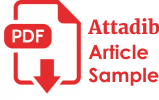- Focus and Scope
- Section Policies
- Peer Review Process
- Publication Frequency
- Open Access Policy
- Archiving
- Publication Ethics
Focus and Scope
Attadib: Journal of Elementary Education is a peer-reviewed journal to discuss about new findings in basic education especially at primary/elementary schools. This journal is publishing original research articles and case studies focused on basic education. All papers are peer-reviewed by at least two reviewers.
The scope of Attadib: Journal of Elementary Education is:
1. Curriculum Design in MI / SD
2. Learning (Math, Science, Social Studies, Civics, English, Indonesian, Islamic Education, Art and Local content) in MI / SD
3. Media and Educational Viewer tool in Learning in MI / SD
4. Learning Strategies in MI / SD
5. Teacher Competence MI / SD
6. Neuro Psycholinguistics for Children MI / SD
7. Technologies Innovation Development in Learning in MI / SD
Section Policies
Articles
Peer Review Process
Review policy by Attadib: Journal of Elementary Education as follows:
|
| |
Comments from reviewers will be the consideration for Editors to decide:
|
| |
An article was rejected for publication due to various considerations, including:
|
|
Publication Frequency
Attadib: Journal of Elementary Education is published twice a year, in June and December. |
|
Open Access Policy
This journal provides immediate open access to its content on the principle that making research freely available to the public supports a greater global exchange of knowledge. This journal is open access journal which means that all content is freely available without charge to users or / institution. Users are allowed to read, download, copy, distribute, print, search, or link to full text articles in this journal without asking prior permission from the publisher or author. This is in accordance with Budapest Open Access Initiative. |
|
Archiving
This journal utilizes the LOCKSS system to create a distributed archiving system among participating libraries and permits those libraries to create permanent archives of the journal for purposes of preservation and restoration. |
Publication Ethics
Attadib: Journal of Elementary Education is a peer-reviewed journal. This statement clarifies the ethical behavior of all parties involved in the act of publishing an article in this journal. This statement is based on the Committee on Publication Ethics (COPE) Guidelines on Good Publication Practice. |
| |
Fair play. An editor at any time evaluate manuscripts for their intellectual content without regard to race, gender, sexual orientation, religious belief, ethnic origin, citizenship, or political philosophy of the authors. |
| |
| Confidentiality. The editor and any editorial staff must not disclose any information about a submitted manuscript to anyone other than the corresponding author, reviewers, potential reviewers, other editorial advisers, and the publisher, as appropriate. |
| |
Disclosure and conflicts of interest. Unpublished materials disclosed in a submitted manuscript must not be used in an editor's own research without the express written consent of the author. Privileged information or ideas obtained through peer review must be kept confidential and not used for personal advantage. Reviewers should not consider manuscripts in which they have conflicts of interest resulting from competitive, collaborative, or other relationships or connections with any of the authors, companies, or institutions connected to the papers. |
| |
Promptness. Any selected referee who feels unqualified to review the research reported in a manuscript or knows that its prompt review will be impossible should notify the editor and excuse himself from the review process. |
| |
Confidentiality. Any manuscripts received for review must be treated as confidential documents. They must not be shown to or discussed with others except as authorized by the editor. |
| |
| Standards of Objectivity. Reviews should be conducted objectively. Personal criticism of the author is inappropriate. Referees should express their views clearly with supporting arguments. | ||
Acknowledgement of Sources. Reviewers should identify relevant published work that has not been cited by the authors. Any statement that an observation, derivation, or argument had been previously reported should be accompanied by the relevant citation. A reviewer should also call to the editor's attention any substantial similarity or overlap between the manuscript under consideration and any other published paper of which they plagiarism indicated. | ||
| Reporting Standards. Authors of reports of original research should present an accurate account of the work performed as well as an objective discussion of its significance. Underlying data should be represented accurately in the paper. A paper should contain sufficient detail and references to permit others to replicate the work. Fraudulent or knowingly inaccurate statements constitute unethical behavior and are unacceptable. | ||
| Data Access and Retention. Authors are asked to provide the raw data in connection with a paper for editorial review, and should be prepared to provide public access to such data (consistent with the ALPSP-STM Statement on Data and Databases), if practicable, and should in any event be prepared to retain such data for a reasonable time after publication. |














